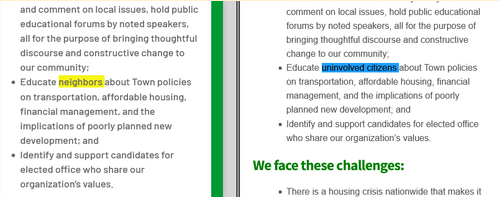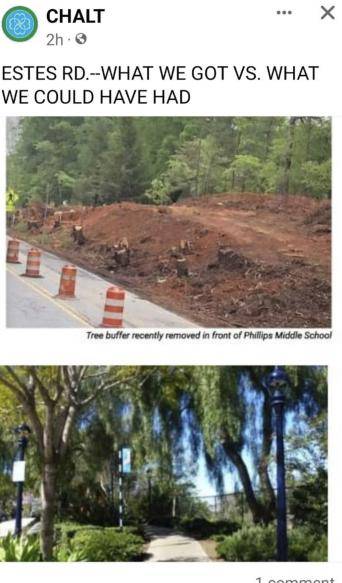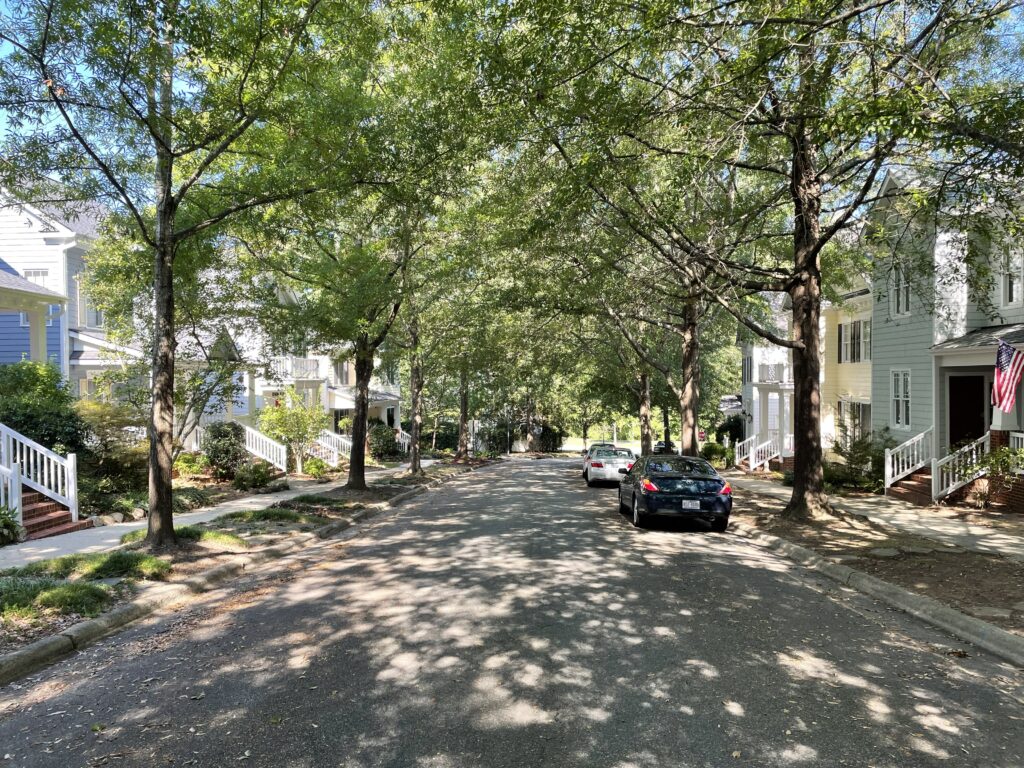Labor Day marks the traditional beginning of the municipal election campaign season—one of our favorite times of the year. And earlier this week the Chapel Hill Alliance for a Livable Town (CHALT) launched a new website.
CHALT is an “anti-development community group” that has “opposed nearly every major development proposal” in Chapel Hill since its inception in 2014/2015. They formed a PAC in 2017. The organization recruits and endorses candidates and sends out campaign mailers.
Their website’s new redesign features updated graphics and a new navigation menu. Unfortunately, the fresh coat of paint is only skin-deep, as CHALT continues to promote the same policies that make our college town a less walkable, and more exclusive and unaffordable place to live.
What changed on the website
Like most website redesigns, the new CHALT site features some text additions and changes: the About page was reworked. They’ve changed the phrase “uninvolved citizens” on their Goals page to “neighbors”—an improvement. And there are also some deletions: a previous version of the CHALT website said one of their goals was to advocate for “Education that meets the needs of students of differing abilities.” This is no longer on their present website.

The site also launched with a brand new bulleted list of grievances. It’s entitled: “A Few Reasons Why Chapel Hill Needs New Leadership.” Before we get into the nitty gritty—because there’s a heckuva lot wrong with this post—we want to note its authorship:
- The post was posted by an account called admin. But if you look in the URL, you’ll see admin is listed as:
Julie McClintock is a former Chapel Hill Town Council member and a leader in the Alliance of Neighborhoods, Neighbors for Responsible Growth, Citizens for Livable Communities, Estes Neighbors, Affordable Transit for All (which worked to block light rail), the Booker Creek Alliance, Save Bolin Creek, and Friends of Bolin Creek.
Notably, Julie McClintock does not live in Chapel Hill or even Orange County. She moved to Chatham County, but is still authoring posts for CHALT and is listed as one of CHALT’s coordinators for 2023. The other six coordinators for CHALT do live in Chapel Hill. All seven coordinators are retirees in their 70s and 80s, and many of them purchased homes decades before the current housing crisis.
Festivus in Chapel Hill: The airing of the grievances
CHALT’s new post contains the same vague evidence-free complaints, incorrect information, and advocacy of unhelpful policies that CHALT has touted for the past 8 years. And some of the information is just plain wrong.
For example, one of their grievances is that the current town council has been “developing a connectivity plan that has not been implemented.” CHALT strenuously opposed the connectivity plan, and their leadership appeared at many community meetings on the topic. The connectivity plan has already been adopted by the current town council and is being implemented in new developments, such as the new townhouse community Stanet’s Place off of Homestead. It will take time before new connections are added to existing roads. (We wrote about it here.)
Another grievance? The “Failure to plant canopy trees and safe sidewalks along major routes used by walkers and bus riders.” Thanks to our current Mayor and Town Council, those types of facilities are going in right now. If you’ve driven along Estes Road over the past year, you’ll see the safe sidewalk for walkers and bus riders (along with bicycle lanes) being installed. Construction of a multi-use path along a segment of Fordham Boulevard should begin shortly, and others are being planned. And yes, there will be trees, but it’s best to wait to plant those until after you’re finished grading land and pouring concrete, so you don’t kill the trees.
A third? “Mortgaging the town hall to pay for Elliott Road Extension.” This refers to a 2017 decision by Town Council to approve using Town Hall and Fire Station No. 1 as collateral for $8 million in installment financing to pay for road construction and improvements including construction, equipment, a pool project, and road and driveway work. Future tax revenue was expected to repay the debt. That happened. Beginning in 2021-22, the revenue that the town makes from Blue Hill started to exceed the debt payment. And the new road—Elliot Road Extension—just opened and is projected to carry 7,800 cars per day. Now that it’s built, people on the east side of Chapel Hill use it to get to Whole Foods—and the Chapel Hill Public Library—while reducing vehicle miles traveled (a good thing) because they no longer have to go really far out of the way. It’s also a safer and more convenient way to cross Fordham Boulevard for people on bike than the intersection at Ephesus Church Road, and includes some well-designed bike lanes that are up on the curb and separated from car traffic.
It goes on and on. They cite the “failure to prioritize small local and non-profit developer projects.” CHALT is currently opposing a project from a small local developer, Ernie Brown III. We’re also hard pressed to think of any specific examples. We tend to agree that the Town’s Land use Management Ordinance (LUMO) and let’s-make-a-deal system for approving development applications benefits larger developers, but the alternative—clear rules and more by-right development opportunities—is not something they would support.
They cite “unintended consequences of poor policy decisions resulted in additional town spending.” This is vague and amorphous—it could apply to anything or nothing. We personally think one poor policy decision was spending $1 million on a “town-wide traffic model,” something that CHALT long championed and whose outcome will be wider and faster roads, but we suppose this is probably not self-criticism.
Another: The “misguided plans to cut down acres of trees to create a containment basin.” In June 2021, Mayor Hemminger and three councilmembers petitioned the Town to pause the design and construction of proposed stormwater mitigation projects “to allow the town to re-evaluate project goals and explore alternatives that will preserve functioning natural hydrological systems and protect our mature forests and habitat.” On September 22, 2021, Town Council unanimously voted to withdraw its approval of six storage basins and approved the creation of a “Working Group on Stormwater Management in the Booker Creek Watershed.” Members of CHALT served on that working group. It’s odd that CHALT is unhappy that their concerns were addressed and preferred steps taken.
Keep in mind what the “before” and “after” are.
CHALT will often contrast a project underway with a project that’s been finished for decades. This is misleading for an obvious reason: projects underway will look like construction sites and projects that have been completed for decades don’t look like construction sites. Take this recent social media post:

It shows the sidewalk construction that’s currently taking place on Estes, which, like most construction projects, involves some significant earth moving. Because trees were really close to the narrow Estes Road, they had to come down to provide the new sidewalk and bike lanes. As we noted earlier, trees will be planted later. The bottom photo shows a park in San Diego built in 2008 with a walking path. The foliage has grown over the course of many years. That’s… different.

Look at this recent photo (above) from Southern Village, with its tree-lined streets and sidewalks. Twenty-five years ago, when it was under construction, the area was just dirt, like Estes Road is today. If you think sidewalks and greenways are important, in most cases you need to accept that a few trees will need to come down, and new ones will then be planted.
We watch council meetings and often other meetings, and what we see is people listening to constituents, making compromises, examining outside evidence, and making decisions that move us forward.
What CHALT wants is to have a council that listens to them and only them. But they’re not representative of our town. Chapel Hill isn’t great if you don’t have a lot of money, or live alone, or get divorced and want to live near your kids, or have an aging parent who has to stay in a huge two-level because you can’t build a duplex in your neighborhood.
But it can be better.
That involves making our town more livable for many—not just a select few.
This piece was written by John Rees, Martin Johnson, Geoff Green, and Melody Kramer.
